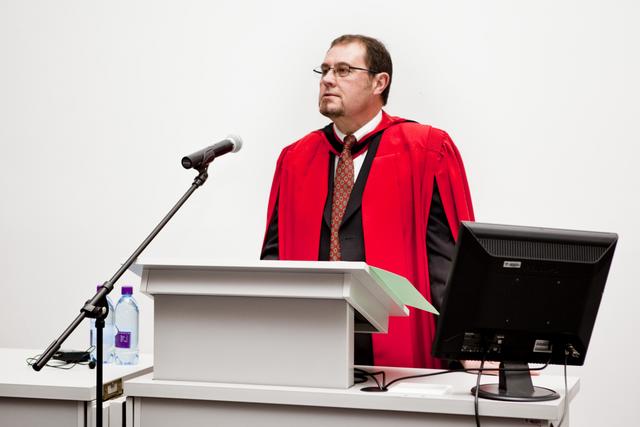
Professor Gareth Cornwell of the Department of English presented his inaugural lecture last week, which looked into what he believes the core commitment of literary studies should be, and what it has, to his dismay, in fact become over the last forty years.
Entitled “Literary Studies – Back to the Future”, the lecture was a plea for the value and importance of disciplinarity.
Literary studies spent the first half of the twentieth century defining its object of investigation and refining its methodology; it spent the second half of the century undermining these achievements and destroying the consensus on which they depended.
Prof Cornwell identifies two principal catalysts in this process, the first being the rise of the materialist paradigm, resulting in the symptomatic reading of texts for what they reveal of historical forces, and the second the “abstract sophistries” of so-called ‘Continental Philosophy’ . Then in the 1970s and 80s a development in the Humanities known as the “linguistic turn” resulted in the supposed “unmasking” of all human thought as mere discourse, rule-governed behaviour generating not knowledge but contingent constructs.
The consequence for the literary critic, the anthropologist and the nuclear physicist alike, is something akin to incarceration in a discursive prison-house, from which it is possible to see and say only what the arbitrary conventions of a disciplinary discourse allow. Within this paradigm there can be no such thing as objective truth, and judgments of meaning and value are permanently disabled by contingency. Empiricism is naivety, and common sense is self-deception.
“If we took this entirely seriously” says Prof Cornwell, “we would be epistemologically disabled and permanently disqualified from pronouncing on anything at all. Experience – the evidence of our senses and the motions of mind and heart that it prompts – is the thing most real and true to which we can lay claim.”
The modern study of literature was inaugurated, in the years before and after the Russian Revolution, by a group of scholars known collectively as the Russian Formalists and later codified by Roman Jakobson in 1958, when he defined the literary text in terms of the dominance of the “poetic function”, which conduced to “message for its own sake”. This, says Prof Cornwell, puts the reader under a logical obligation to read the text respectfully, as an end in itself, rather than instrumentally, as a source of information about the world or an instantiation of a set of pre-existing ideas.
An additional obligation exists: to attempt to ascertain the author’s intention in writing the text and to then account for precisely how that intention is conveyed or realised. This is the first task of the literary critic.
However, Prof Cornwell has the sense that things are likely to get worse rather than better for the approach to literature that he had sketched out for the audience:
“Today we find ourselves in the Humanities in an intellectual climate in which a largely unexamined notion of ‘interdisciplinary studies’ is all the rage. At this university, for example, there are currently initiatives… that envisage English “synergising” with other departments in joint teaching and research ventures aimed at addressing the social, economic and educational challenges of the day. I dare say our Department will want to pitch in, and that we shall do so to the best of our ability. But we shall do so – in the perspective I have outlined this evening – at the cost of shirking our disciplinary responsibility.”
The poetic function of the literary text will have to take a back seat to its referential function, he warns, as literature will be treated as just another source of information. In his view, the “external pressure of interdisciplinarity serves to add momentum and authority to the entropic tendencies already existent within literary studies.”
While he stresses that he is not against interdisciplinarity in principle, he reiterates that a “one size fits all” approach works better with some disciplines than with others, and that English falls into the category of “others”. Neither is he arguing for a return to a so-called golden age, doubting that there was ever a time when English was not a contested subject.
Prof Cornwell believes that in this country, where there is no extensive intellectual book review culture, it is the duty of the English department to address the future by engaging with the present. “English academics should be reading, evaluating and reporting on recent and contemporary writing, and by no means only from South Africa. It is in this way – rather than through strategic misreadings and appropriations – that the canon can best be revised and reinvigorated. At the same time, exciting opportunities for original research and innovative teaching are generated.”
Turning to the prospects for a modern South African literary intellectual tradition, Prof Cornwell notes that the similarities on which it could be built are largely obscured by social and political differences. He makes the following observation: “First, it is a tradition to be anchored in the things thought and said by creative writers, not academics; and secondly – like the critical orientation I have been advocating – its distinguishing features are (and must be) empiricism and pragmatism.
“In other words it is and must be the opposite, in literary terms, of the discourse of social engineering in politics. Social engineering, I might add – the assumption that the abstract somehow trumps the concrete, the notion that reality can be corrected through the formulation of policy and its forceful implementation – has been, and continues to be, the scourge of this country and its people.”
Story by Jeannie McKeown
Picture by Sophie Smith
